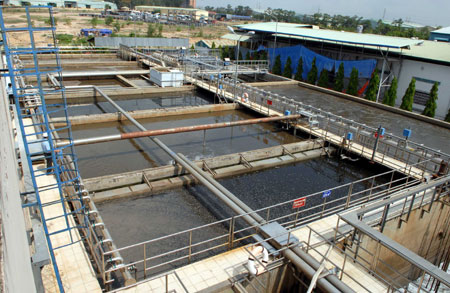
Many firms in southern Dong Nai Province found to be releasing toxic waste into the environment will have their permits withdrawn by the end of the year.
Many firms in southern Dong Nai Province found to be releasing toxic waste into the environment will have their permits withdrawn by the end of the year.
 |
| A corner of the waste water treatment plant at the Bien Hoa 2 Industrial Park, Dong Nai Province. Authorities will withdraw licences of firms that are slow to set up waste treatment facilities |
The order was issued by the director of the provincial Department of Natural Resources and Environment, Le Viet Hung, as the amount of harmful waste is reported to be rising steadily.
He said many businesses were also too slow to set up waste treatment facilities.
According to a recent department report, every day the province produces more than 120 tonnes of harmful waste, but only about 100 tonnes is collected for treatment.
Some waste collecting agencies are reported to sell recyclable waste and then discharge the remaining in deserted areas, including the roadsides, seriously polluting the environment.
Recently, the department inspected a daily waste and industrial solid-waste zone in Bau Can Commune, Long Thanh District.
It showed that construction covered only 3ha out of the 90ha allotted. About 150ha of waste is dumped and burnt in the area each day, producing acrid pollution that upsets residents.
Project owner, Nguyen Quoc Trinh, director of the Phuc Thien Long Commercial Services Co Ltd, said that construction had started two years ago and was expected to be completed by the end of 2015.
Each day, the zone plans to treat 450 tonnes of daily waste, 160 tonnes of industrial waste and 100 tonnes of harmful industrial waste.
However, Trinh said the US$30 million project had met difficulties in mobilising funds and was temporarily forced to stop work.
Trinh proposed the province allow such enterprises to borrow money at preferential interest rates.
Hung said the province had closed temporary rubbish dumps in areas used to build waste-treatment zones.
As many as 13 out of 28 dumps were closed.
(Source: VNS)



